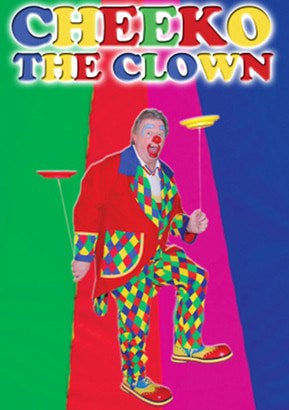A clown is a public entertainer who dresses in outlandish attire and attempts to please audiences with comical and chaotic behaviour.
Clowns are typically hired to entertain children at events such as birthday parties and public gatherings.
Clowns have been a popular form of entertainer since before the time of Ancient Greece, and in the UK, their popularity exploded with the introduction of Philip Astley’s universal show in the late 18th Century.
They typically wear exaggerated clothing in the “grotesque” classical style: large shoes, red noses, large wigs, colourful clothing and wild accessories.
The clown is a public entertainer, commissioned for gatherings or personal appearances for the amusement of the hirer.
Even today, hundreds of years later, the market for clowning in the UK is alive and well.
Most clowns are freelance entertainers, available for bookings for special events, fêtes and parties.
Some are able to find work with travelling circuses or on the fixed entertainment circuit, such as performances in holiday resorts or at commercial functions.
Most, though, choose to freelance, travelling wherever the booking may take them.
They will tell jokes, stories, perform slapstick routines and involve the audiences in an attempt to make them laugh and enjoy the performance.
Salary
Due to the freelance nature of the role, there is not a typical salary as such.
Candidates normally begin with low-key children’s parties whilst they develop their routine and create additional bookings through word-of-mouth marketing.
A clown starting out with a limited circuit of bookings may expect to earn in the region of £5,000 per annum, and will normally run the business as an ancillary to an unrelated full-time job.
Some become very popular after an extended time on the entertainment circuit, and can receive up to £25,000 in show revenue.
Like many freelance professions, it is often down to the level of input from the candidate, and quite a bit of luck.
Responsibilities
- Design outfit and accessories to enable an effective.
slapstick performance, by use of relevant props and materials. - Arrive at established “show” area and perform as per the hiring agent’s expectations.
- Establish word-of-mouth advertising in the local area to encourage further future bookings.
- Manage diary of ongoing work.
- Be punctual, entertaining and approachable.
- Manage administrative functions of the “sole-trader” business.
Qualifications
There are no formal academic barriers to entry, although a GCSE in drama or a BTEC in performing arts can be useful in learning the skills necessary to conduct a public performance, and to overcome nerves.
Many clowns do actually come from an academic background in drama, as it is often this which catalyses the desire to enter performance arts.
Clowning is still one of the most unusual and character-driven areas of performance art.
Skills
- Understanding of audience expectations for performance quality and authenticity.
- Understanding of marketing or advertising techniques, at least on a local basis, to increase bookings and revenue.
- Be able to design, procure and implement clothing and accessories to enable effective live performance.
- Ability to speak in public without trepidation.
- Ability to handle changing audience expectations, especially where children are concerned.
- Be able to appreciably handle health and safety requirements during the show, for the safety and enjoyment of all.
Working Conditions
Most areas of performance art would tend to be classed as low-risk working environments, and clowning is no different.
It is, however, worth being respectful of the fact that shows are conducted around hot stage lighting, and consequently, live electrics.
Also, because the shows are being performed in close proximity to the public, it is essential that the well-being of audiences is a consideration also.
The role also involves a great deal of driving, and sometimes, the method of transportation can also form part of the act; for example, the clown may utilise an old Volkswagen camper, again decorated in an appropriate manner.
Experience
Clowning is a relatively easy business to set up from scratch, requiring only a costume, props and a mode of transport.
Most clowns begin with small children’s shows for birthday parties within the home, and then progress as they develop their act and establish a client base for repeat custom.
Employers
Most clowns operate either on their own as a ‘one man band’, or in a pair or trio.
For this reason, there are no major employers as such, although some choose to join a full-time entertainment tour, such as with a renowned circus like Chipperfield’s in the UK, or Continental Circus Berlin in Germany.
Although seen as something of a dying art over the last few decades, some American and European shows still attract big crowds, and competition for audition is hotly contested.
Image

Also known as…
- Jester
- Entertainer
Related Jobs
- Ventriloquist
- Magician
- Performer
- Puppeteer
What’s it really like?
Tommy Templar works as a self-employed clown for hire, and also as a magician.
His clown alter ego is Cheeko the Clown, who is a very popular entertainer in Scotland.
What made you decide to choose to get into this sort of career?
My grandfather entertained me with some magic tricks and I was hooked from then.
I joined the Magic Circle and performed as a magician in the working men’s clubs, performing a comedy illusion show.
Then the economic climate changed and the clubs closed, so I went into children’s entertaining.
I was asked by Neil Drover agency to do my children’s show as a clown.
I tried it and it was a big success, so I went from magician to clown.
I still use a lot of magic in my show, and I still perform as a magician, but my main income is as a clown.
Do you have a standard day or a standard type of `exercise’?
Nothing is standard; everything is bespoke.
You don’t know what the day will bring, so in a way that can be quite exciting!
What is the most common type of problem/call-out/enquiry you must attend to?
Birthday parties are a big part of my income, so I’m helping to make the birthday boy or girl’s day that bit more special.
I also perform at a lot of shopping centres, weddings and do a lot of corporate work.
What do you like most about the job?
Being self-employed and travelling all over is great.
I’m just back from Malawi, where I performed at four shows.
I have also travelled to America several times, Spain several times and Cyprus several times, as well as up and down the UK.
What do you like least about the job?
There is nothing I dislike about what I do.
If there was I wouldn’t be doing it.
What are the key responsibilities?
Not letting people down, having a totally professional attitude and enjoying what you are doing.
If you enjoy what you are doing, then it comes across in the performance.
What about academic requirements? Any formal demands, eg- A Levels?
A level Jig-saw and A level Plasticine!
No, not really.
Who is the longest serving member in your team/division?
I am a one-man show and have been performing for 38 years, the last 20 years full time.
What is the starting salary and how does this increase over time with promotion?
The salary is dependent on yourself and how you approach the business.
You can make £5000 part-time, but the sky is the limit full-time; you have to work at it.
The problem is that other people don’t understand that this is your living and tend to think that it’s a hobby, and as such treat you that way.
If you left this position, what else would you consider/prefer doing?
I’m very fortunate that I can continue in this business for as long as I want, and as long as my health permits me to, so I hope to be going for a long time yet.
How far is it possible to progress within the organization?
You’re a one-man business and it’s up to the individual to make the most of it.
You have to keep working at it, or, like any other business, you will be left behind.
What advice do you have for someone who is looking to get into this as a career?
Start off doing it on a part-time basis, as most birthday parties are at the weekend; it lets you work around your main job until you have enough business to go full-time.
What are the most important qualities an applicant must or should possess?
You have to be outgoing and friendly, like meeting people and travelling.
Any closing comments/thoughts?
You should join an association like the Magic Circle or Ace Performers.
This will help you by offering in-house teaching and gives you the opportunity of going to lectures, so you are continually developing.









